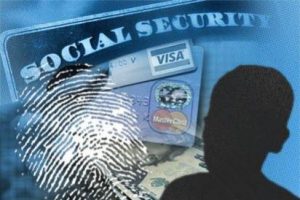A missing wallet or purse sets off an instant alarm, but many victims of identity theft don’t realize it until months after the fact, when the damage has been done to their finances and credit. Nobody wants to be a victim of identity theft, but if you’re lucky (or you know the signs), you’ll quickly realize when your identity has been stolen. Here’s what to look for if you’re concerned about possible identity theft…
Do You Know the Signs of Identity Theft?
In some cases, the tip off comes when you start receiving bills for things you did not buy. Even if your credit cards are still safely in your pocket, the information on them may be used to buy things online. Phishing scams, in which hackers use emails to trick people into giving up the keys to the kingdom, are still common. Along those lines, does your social media profile reveal your home address, birthday, and your pet’s name? And it’s low-tech, but be careful when discarding financial records in the trash, where someone might find them and glean your account details.
Despite your best efforts, your personal information and credit card numbers can end up for sale on the dark web, as a result of a data breach. And given the right bits of personal information, identity thieves may open charge accounts, utility accounts, and unsecured loan accounts in your name. Often they use a billing address different from the victim’s, so the first notice the victim receives is a call from a collection agency. By then, you may be on the hook for thousands of dollars with dozens of creditors. And the scammer could be long gone.
Other signs of that may point to identity theft include a sudden drop in your credit score, mail pieces with your address but another person’s name, and (big red flag) a notice confirming that your annual taxes were filed, before you actually did so. If that happens, a scammer has your social security number, and is trying to steal your refund.

The first thing to do when you suspect that your identity has been stolen is to file fraud alerts with all of your financial partners and the major credit bureaus. Here are links and phone numbers for the credit bureaus. Equifax: 888-836-6351; Experian: 888-397-3742; TransUnion: 800-680-7289. You don’t need to contact all three credit bureaus to place a fraud alert. The Fair Credit Reporting Act requires each of them to notify the others of the alert.
Fraud alerts expire after 90 days, but you can renew them. A fraud alert doesn’t prevent you from opening a new credit account if needed. It does require creditors to do “due diligence” which means they have to contact you to make sure you really are the one trying to open an account.
Fraud Alert or Credit Freeze?
You can also request a “credit freeze” from each of the credit bureaus, which prevents anyone – including you – from obtaining new credit in your name. A credit freeze will prevent new accounts from being opened, because it blocks lenders from checking your credit. A credit freeze won’t stop you from opening a new account, you can lift the freeze temporarily.
Unlike fraud alerts, you must contact each credit bureau (Equifax, Experian, and Transunion) to initiate a credit freeze. You’ll need to supply personal information including your name, address, birth date, and Social Security number. When the freeze is done, you’ll get a PIN or password from each of the credit bureaus, which you can use if you need to temporarily lift the freeze.
A credit bureau must lift a freeze within one hour, if you request it by phone or online. Requests made by mail can take several days. Ask which credit bureau the lender will be contacting, so you don’t have to unfreeze all three of your credit reports.
Get Your Free Credit Reports (and Your Credit Score)
The credit bureaus are also required to give victims of identity theft free copies of their credit reports. These reports can help you discover unauthorized applications for credit made in your name.
Even if you’re not concerned about possible identity theft, you can get FOUR credit reports every year for free. The link above will show you how it’s done, and how to avoid the potential pitfalls. And on a related note, do you know how a credit SCORE is different from a credit REPORT?
Minimizing the Damage of Identity Theft
If your credit card is lost or stolen, you must report it immediately. Once you have reported your credit cards stolen, you will not be liable for any additional charges that may be made with them. Use these phone numbers to contact the credit card companies:
- American Express: 800-297-7672
- Discover Card: 800-347-2683
- MasterCard: 800-622-7747
- VISA: 866-434-6854
Next step: File a police report. Although local police have little power to track down identity thieves across the country, a police report is generally required by other entities when you are trying to repair your credit record.
Contact your State’s department of motor vehicles to see if anyone has tried to obtain a driver’s license in your name. Do likewise with the Social Security Administration (800-772-1213). Request a copy of your Social Security earnings history to ensure that it is correct. It’s not uncommon to find that someone else is working under your name.
If you’re positive you have been a victim of identity theft, you should close all of your existing credit card accounts immediately. Replace them with new ones if you can. Ask your bank if closing your checking or savings account is a good idea as well.
Change all of your online passwords, even if they are not associated with financial accounts. Be sure to choose strong passwords with a mixture of upper and lower case letters, digits, and special characters.
A credit monitoring service may seem like a good idea right after you’ve been victimized by identity theft. Such services charge a monthly fee of $10 to $15 to monitor your credit records and alert you of any unusual activity. But they don’t prevent identity theft; they only alert you to a problem after you have one. Yes, they will file all of the alerts mentioned above with credit bureaus and card companies, but you can do that yourself.
And credit monitoring services won’t do the heavy lifting of defending you against fraudulent debts or rebuilding your credit. Most consumer advocates consider credit monitoring services to be a waste of money.
Have A Great Week From All Of Us At Zoha Islands/Fruit Islands
